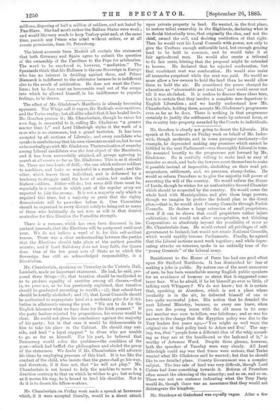upon private property in land. He wanted, in the first
place, to restore tribal ownership in the Highlands, declaring what is no doubt historically true, that originally the clan, and not the chid, owned the soil, and desiring restitution of that right. Then 'he would vest his Local Councils with power, not only to give the Crofters enough culturable land, but enough grazing land to be held in common, and he would take it at fair agricultural rent. He would also create a tribunal to fix fair rents, hinting that the proposal might be extended to houses. He declared that he rejected confiscation, but that exorbitant rent was confiscation. He would also make all tenancies perpetual while the rent was paid. He would no more allow a few owners to hold the land than he would allow them to hold the air. He considered the pence charged for education an " abominable and cruel tax," and would never rest till it was abolished. It is useless to discuss these ideas here, but it is certain that they involve a complete new departure in English Liberalism ; and we hardly understand how Mr. Chamberlain, holding them, accepts Mr. Gladstone's programme even as far as he does. There is nothing in that programme certainly to justify the settlement of rents by external force, or the re-entry into property awarded by the Courts to individuals.


































 Previous page
Previous page